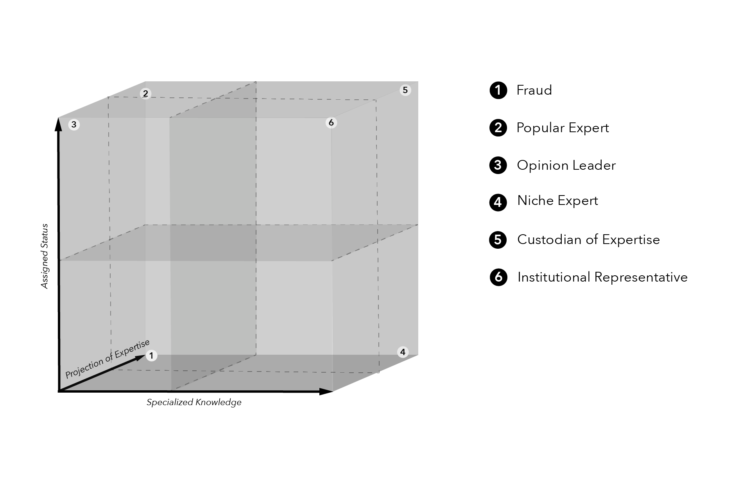When is an expert? Communicating Expertise on Online Platforms
Team: Lea Stöter, Hugo Bezombes, Mirko Tobias Schäfer
Experts in the age of social media
With the advent of social media, we have seen the emergence of heated debates in online fora, social media and other web platforms. The debates appear to be polarizing between partisan positions, and the participating experts and their expertise becomes politicized (e.g. Bogner 2021; Eyal 2019). In online debates, participants without any formal recognition of expertise still can find audiences to whom they effectively project expertise. This is not all negative: marginalised expertise can find audiences online, and topics which are not yet formally recognized by knowledge institutions, skills that are not yet taught within the established school and university systems are disseminated online.
The aim of this research effort is to then on the one hand identify the new participants who have not been sufficiently covered in debates before, and on the other hand highlight the social media dynamics which offer distinct forms of projecting and assigning expertise separate from the possession of specialized knowledge. Our framework of expertise in online spaces highlights the distinct personas of users who take on variations of expert roles, and aids in identifying who acts as and who is recognized as expert in various debates.
Defining experts and expertise
During our exploration of relevant scholarship on expertise and the role of experts, two distinct schools of thought about the source of expertise emerged from the literature: While Collins and Evans (2007) in their periodic table of expertise identify expertise as the possession of specialized tacit knowledge, therefore seeing expertise as residing inside the person who through his knowledge then becomes an expert. On the other side, scholars like Turner (2001) and Grundmann (2017) view expertise as assigned to a person by an audience either through gaining legitimacy within a sub-audience (Turner, 2001) or through their client-approved performance of their knowledge (Grundmann, 2017). This distinction between expertise as assigned and expertise as the possession of specialized knowledge lays the groundwork for our framework of the expert roles in online debates.
A framework for locating expertise in public debates
Based on these theoretical insights, we attempt to reconcile the different understandings of expertise in the public debate by creating a three-dimensional framework for how expertise is owned, projected and assigned. Our framework allows to identify different categories of experts appearing in social media debates, and to differentiate them in terms of their actual specialized knowledge, how and if they are perceived as experts by their audience, and how they project expertise. These three axes or dimensions form a space in which we can allocate different positions of expert participants in public debates.
This differentiation between specialized knowledge, assigned status, and projection of expertise results in the identification of distinct expert roles on the extremes of the spectrum on each dimension. While three of these roles – the niche expert, custodian of expertise, and institutional representative – are based on existing literature (Horst 2013), the fraud, the popular expert, and the opinion leader are the newly added expert roles emerging from less formalized debate on social media and other discussion platforms. Our six categories of experts correspond with the different roles that are recognizable in online debates, where the threshold for participation is significantly lower than in traditional epistemic cultures.

Operationalization & Application
When operationalizing the framework for analysis, the focus was not only on being able to identify the variables in social media environments, but also on the applicability of the framework to one debate and one platform at the time. Using Twitter’s affordance and content, we analyzed the participants of the debates surrounding the Dutch farmers’ protests and the use of hydroxychloroquine as an alternative treatment for Covid-19 in the Netherlands. A close reading and network analysis of samples of tweets, indicated that prominent participants within one topic community of a debate take on similar expert roles. Here it is noteworthy, that the identified communities have selected their own standard-bearers which possess clout within the debate, regardless of the academic labels that we may attach to them.
Conclusion
Social media and platform dynamics affect how expertise is perceived within different topic communities. While the scholarly literature on expertise initially considered specialized –often academic- knowledge, we find that social media conversations pay less attention to such indicators. Specialized knowledge, affiliation with established knowledge institutions and scientific consensus are less relevant. Platforms allow for the emergence, dissemination and further generation of specialized knowledge that develops also independent from and outside established knowledge institutions. However, it appears that audiences choose whatever expert statement, scientific result, or person speaks best to their beliefs rather than to truth. The status of expert is therefore very much determined through the status assigned by the respective topic community.
The framework we provided allows to capture expertise as it is assigned and projected within social media debates and can function as a concept to understand the dimensions of expert roles or as analytical tool for the interpretation of the roles of debate participants. The conceptual framework also considers the fluidity of social media debates and accounts for changing roles within a selected debate and beyond. Our attempt to develop ‘quantifiable’ indicators for the position of participants within a debate along the three dimensions of Assigned Status, Projection of Expertise, and Specialized Knowledge might enable platform providers for developing apt analysis tools to identify undesirable dynamics of disseminating misinformation, or to indicate the quality of a debate or topic community.

